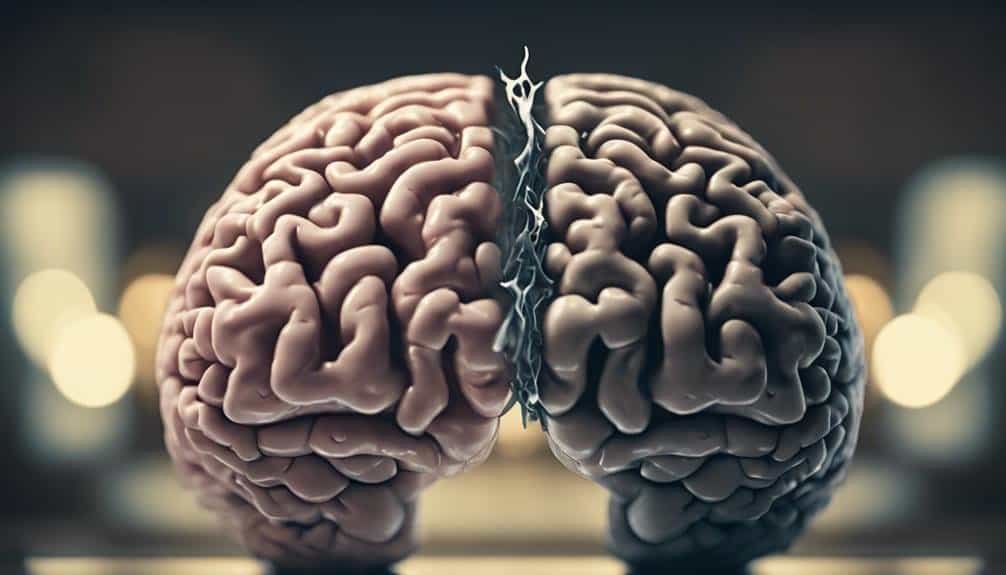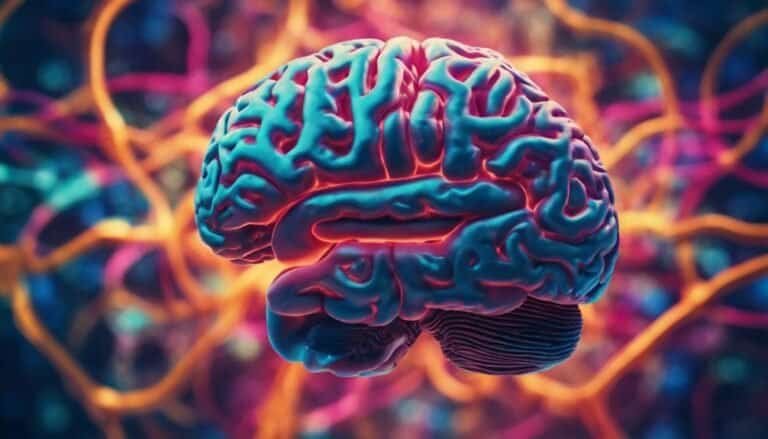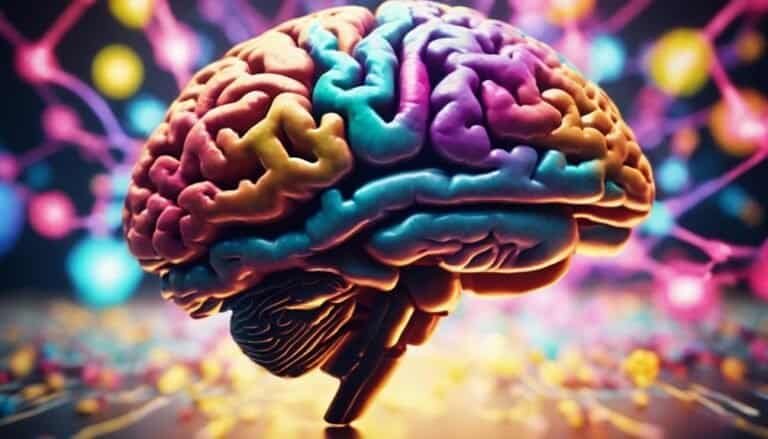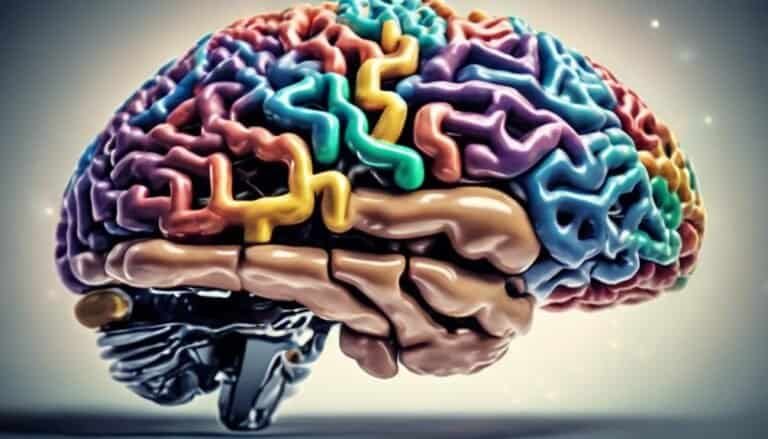Brain's Role in Work-Life Balance
Ever wonder how your brain manages to juggle work deadlines, family responsibilities, and self-care without missing a beat?
The intricate dance of neural pathways and neurotransmitters plays a crucial role in maintaining a semblance of balance in your hectic life. From stress responses to decision-making processes, your brain is the unsung hero behind the scenes.
But how exactly does it pull off this high-wire act, and what can you do to support its efforts?
Key Takeaways
- Neuroplasticity aids in adapting to work-life demands, enhancing cognitive flexibility.
- Stress management is crucial for balancing work and life to prevent detrimental health effects.
- Mindfulness practices improve focus and emotional regulation, supporting work-life balance.
- Cognitive load management optimizes decision-making, enhancing productivity and efficiency.
Neuroplasticity and Adaptation
When considering work-life balance, it's crucial to understand the concept of neuroplasticity and how the brain adapts to different demands. Neural plasticity refers to the brain's ability to reorganize itself by forming new neural connections throughout life. This process allows the brain to adapt to various experiences and challenges, playing a significant role in maintaining balance between work and personal life.
The brain's role in balance is intricate, with neural plasticity being a fundamental mechanism. As you engage in different activities at work and in your personal life, your brain undergoes adaptations to meet the demands placed upon it. For example, when faced with a new work project that requires intense focus, your brain may rewire itself to enhance concentration and cognitive abilities. Conversely, when spending quality time with loved ones, the brain may prioritize emotional processing and social connections. Understanding how neural plasticity influences adaptation can help you make conscious choices to support a harmonious work-life balance.
Stress Response Mechanisms
When faced with stress, your brain triggers the release of stress hormones such as cortisol and adrenaline.
These hormones activate the fight-or-flight response, preparing your body to either confront the stressor or escape from it.
Prolonged activation of these stress response mechanisms can have detrimental effects on your health.
Stress Hormone Release
Stress hormone release plays a crucial role in the body's stress response mechanisms. When stress hits, your body reacts swiftly and efficiently, releasing hormones to prepare you for action.
- Cortisol Regulation: The body's primary stress hormone, cortisol, is released by the adrenal glands during stressful situations.
- Feedback Mechanisms: The release of stress hormones is tightly regulated through complex feedback loops to maintain a balance.
- Impact on Body Functions: Stress hormones affect various bodily functions, such as heart rate, blood pressure, and metabolism.
- Role in Stress Management: Understanding how stress hormones work is essential for effective stress management strategies.
Mastering the regulation of stress hormones is a crucial step towards achieving a healthier work-life balance.
Fight-or-Flight Response
Typically triggered by perceived threats, the fight-or-flight response is a primal survival mechanism that prepares your body for immediate action. When faced with stressors, your brain signals the release of adrenaline and cortisol, preparing you to either confront the danger or flee from it. This response triggers physiological changes like increased heart rate, heightened senses, and a surge of energy to deal with the perceived threat.
To manage this stress response effectively, incorporating stress management techniques is crucial. Relaxation techniques such as deep breathing, meditation, or mindfulness can help regulate your body's response to stress and promote a sense of calm. By engaging in these practices, you can better navigate challenging situations and maintain a healthy work-life balance.
Impact on Health
Activating the fight-or-flight response triggers a cascade of physiological changes that can impact your health in various ways.
- Workplace ergonomics: Prolonged activation of the stress response can lead to musculoskeletal issues if your workspace isn't properly set up.
- Mental well-being: Chronic stress can contribute to anxiety and depression, affecting your overall mental health.
- Nutrition: Stress may alter your eating habits, leading to poor food choices that can impact your physical well-being.
- Exercise habits: High stress levels may result in decreased motivation to exercise, which is crucial for maintaining good health.
It is essential to address stressors promptly by considering factors such as workplace ergonomics, mental well-being, nutrition, and exercise habits to mitigate the negative impact on your health.
Emotional Regulation in the Brain
Emotional regulation in the brain involves the intricate coordination of neural networks responsible for managing and modulating various emotional responses. Mood regulation, a key aspect of emotional processing, is governed by regions such as the prefrontal cortex, amygdala, and hippocampus. The prefrontal cortex plays a crucial role in decision-making, impulse control, and social behavior, all of which are essential for regulating emotions effectively. It aids in assessing the emotional significance of external stimuli and guides appropriate responses.
Moreover, the amygdala, known for its involvement in processing emotions like fear and pleasure, influences the intensity of emotional responses. It acts as an alarm system, signaling potential threats and triggering corresponding reactions. In contrast, the hippocampus helps in contextualizing emotions and memories, allowing for a more nuanced emotional experience.
Cognitive Load and Decision Making
Understanding how cognitive load impacts decision-making processes is essential for grasping the complexities of human behavior. When your cognitive load is high, it can lead to decision fatigue, affecting the quality of your choices. Here are some key points to consider:
- Cognitive load refers to the total amount of mental effort being used in working memory.
- Decision fatigue occurs when the quality of your decisions declines after a long period of decision-making.
- High cognitive load can overwhelm your brain, making it harder to process information and make sound judgments.
- Managing cognitive load is crucial for maintaining optimal decision-making abilities throughout the day.
Dopamine and Reward System
High levels of cognitive load can influence the brain's dopamine release and impact the reward system, shaping decision-making processes and work-life balance. Dopamine, a neurotransmitter, plays a crucial role in motivation triggers and pleasure response. When you accomplish a task or set a goal, dopamine is released in your brain, creating a sensation of pleasure and reinforcing the behavior that led to it. This process is essential for maintaining motivation and drive in both your professional and personal life.
To better understand the relationship between dopamine and reward systems, let's look at a breakdown of key points:
| Dopamine and Reward System | |
|---|---|
| Dopamine Role | Facilitates motivation triggers and pleasure response. |
| Impact on Decision Making | Influences choices based on anticipated rewards. |
| Work-Life Balance | Affects how we prioritize tasks and manage time effectively. |
| Long-Term Effects | Can lead to habit formation and goal achievement. |
| Healthy Dopamine Levels | Essential for overall well-being and satisfaction. |
Sleep Patterns and Brain Health
Sleep patterns significantly impact brain health by influencing various cognitive functions and overall well-being. Understanding the importance of sleep quality is crucial for optimizing brain performance.
Here are some key points to consider:
- REM Sleep: Rapid Eye Movement (REM) sleep is essential for memory consolidation and emotional regulation.
- Deep Sleep: Deep sleep stages are critical for physical restoration, immune function, and growth.
- Sleep Cycles: The regular progression through sleep cycles is vital for brain detoxification and synaptic plasticity.
- Sleep Deprivation: Chronic sleep deprivation can lead to cognitive impairment, mood disturbances, and increased risk of neurodegenerative diseases.
Mindfulness and Neural Connectivity
When you practice mindfulness, you refine your ability to focus and direct attention, engaging specific brain networks crucial for cognitive functions.
This heightened neural connectivity facilitates a stronger mind-body connection, potentially enhancing overall well-being and work-life balance.
Focus and Attention
Mindfulness practices have been shown to enhance neural connectivity associated with focus and attention in the brain.
- Increased cognitive performance.
- Enhanced attentional control.
- Strengthened ability to sustain focus.
- Improved capacity to switch between tasks efficiently.
Engaging in mindfulness techniques like meditation or deep breathing exercises can positively impact the brain's ability to regulate attention and enhance cognitive functions. Studies suggest that regular mindfulness practice can lead to structural changes in the brain, particularly in regions responsible for attentional control. This neural plasticity enables individuals to better manage distractions, maintain concentration, and optimize cognitive performance in various tasks.
Brain Networks Engaged
Engaging in mindfulness techniques such as meditation or deep breathing exercises enhances neural connectivity in the brain related to focus and attention. This improvement is attributed to neural plasticity, the brain's ability to reorganize itself by forming new neural connections.
When you practice mindfulness, you stimulate neural plasticity, strengthening the networks responsible for sustained attention and cognitive control. As a result, your ability to concentrate on tasks increases, leading to higher work efficiency.
Research indicates that individuals who regularly engage in mindfulness activities exhibit enhanced connectivity between brain regions associated with attention regulation. By incorporating these practices into your routine, you can optimize your brain networks for improved focus and overall work performance.
Mind-Body Connection
Enhancing neural connectivity through mindfulness practices like meditation and deep breathing exercises fosters a strong mind-body connection, facilitating optimal brain function for improved focus and cognitive performance.
- Mindfulness practice enhances attention and emotional regulation.
- Increased body awareness improves stress management and overall well-being.
- Mind-body connection boosts resilience and reduces burnout risk.
- Neural connectivity supports efficient information processing and decision-making.
Engaging in mindfulness activities strengthens the neural pathways that link cognitive and emotional centers in the brain, promoting a harmonious relationship between mind and body. This synchronization cultivates a state of balance and clarity, enhancing your ability to navigate work-life challenges with composure and focus.
Hormonal Influences on Balance
Hormonal fluctuations play a crucial role in influencing work-life balance, impacting various aspects of an individual's daily functioning. Hormonal balance is essential for maintaining optimal work performance and managing personal life effectively.
When hormones such as cortisol, adrenaline, and oxytocin aren't regulated properly, it can lead to disruptions in mood, energy levels, and cognitive function, all of which are critical for achieving a healthy work-life balance.
Imbalances in cortisol levels, often associated with stress, can significantly affect your ability to concentrate, make decisions, and handle tasks efficiently. High levels of cortisol can lead to feelings of overwhelm and burnout, making it challenging to juggle work responsibilities with personal life demands. On the other hand, inadequate levels of oxytocin, known as the 'bonding hormone,' can impact your relationships and social interactions, which are vital components of a well-rounded work-life balance.
Understanding how hormonal influences can impact your work-life balance is crucial for implementing strategies to regulate these fluctuations effectively. Prioritizing activities that promote hormonal balance, such as regular exercise, sufficient sleep, and stress management techniques, can help you achieve a more harmonious integration of work and personal life.
Executive Functions and Time Management
When it comes to executive functions and time management, your ability to focus on tasks and set priorities plays a crucial role in maintaining a work-life balance.
Task organization is essential for effective time management, ensuring that you allocate your resources efficiently and meet your goals.
Understanding how your brain's executive functions influence these aspects can help you optimize your productivity and overall well-being.
Focus and Priorities
Maintaining focus and establishing clear priorities are essential components of effective executive functions and time management. When it comes to enhancing your focus and priorities, consider the following:
- Practice mindfulness techniques to boost concentration.
- Utilize tools like to-do lists or digital calendars to organize tasks.
- Set specific and achievable goals to guide your decision-making process.
- Learn to delegate tasks when necessary to optimize productivity.
Task Organization
Effective task organization is crucial for optimizing executive functions and time management in achieving productivity and efficiency. Task prioritization plays a key role in managing your workload effectively. By identifying and arranging tasks based on their importance and deadlines, you can ensure that you focus on what truly matters.
Time management is closely linked to task organization, as allocating the right amount of time to each task is essential for a smooth workflow. Proper task organization not only helps in completing tasks efficiently but also contributes to a productivity boost. It allows you to make the most of your cognitive resources and minimizes distractions, leading to improved work efficiency.
Mastering task organization is a fundamental skill for enhancing your overall performance and achieving your goals.
Social Brain Networks and Relationships
Understanding the intricate web of social brain networks is crucial for comprehending the dynamics of relationships. The brain's social cognition plays a fundamental role in shaping how individuals perceive and interact with others, influencing the complex tapestry of human relationships.
Here are four key points to delve deeper into the fascinating realm of social brain networks and relationships:
- Mirror Neurons: These specialized neurons fire both when an individual performs an action and when they observe someone else doing the same, facilitating empathy and social understanding.
- Default Mode Network: This network is active when the mind is at rest and plays a vital role in self-referential thinking, perspective-taking, and understanding the thoughts and feelings of others.
- Oxytocin Release: Known as the 'love hormone,' oxytocin is linked to bonding, trust, and social attachment, influencing relationship formation and maintenance.
- Emotional Contagion: The phenomenon where individuals mimic the emotions of those around them, highlighting the interconnected nature of social interactions and emotional experiences in relationships.
Conclusion
In conclusion, your brain is like a finely tuned orchestra conducting the delicate balance between work and life.
Neuroplasticity, stress responses, emotional regulation, decision making, reward systems, mindfulness, hormonal influences, executive functions, and social networks all play a part in this symphony.
By understanding and optimizing these brain functions, you can harmonize your work-life balance and lead a more fulfilling and productive life.
So, let your brain be the conductor of your success and well-being.







